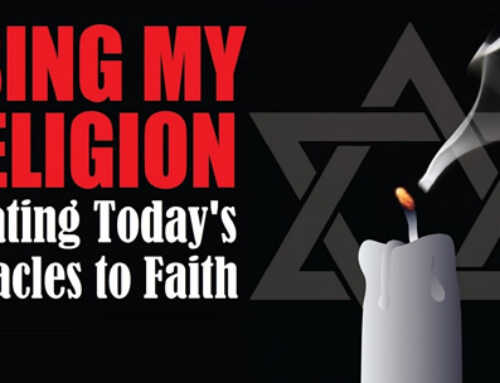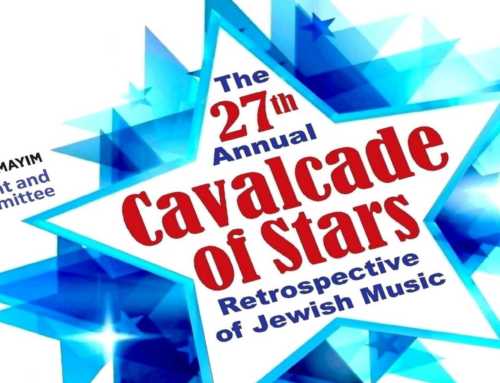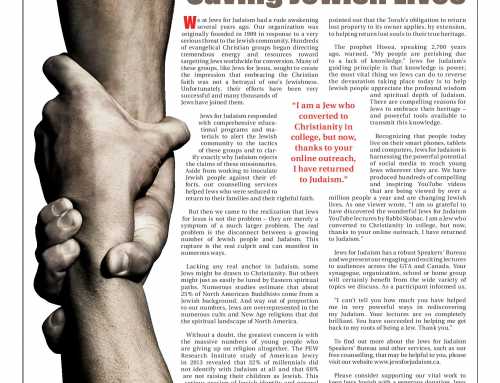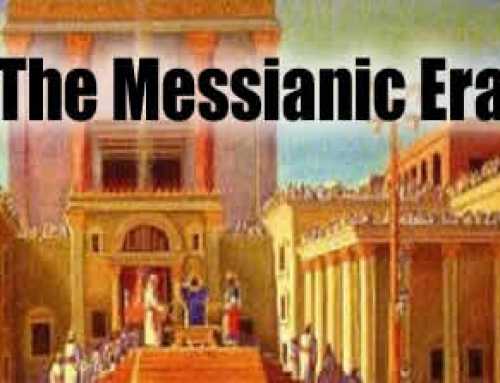Larry Levey: Why I Embraced, then rejected Messianic Judaism
A lawyer reflects on 18 months as a member of the militantly proselytizing Hebrew-Christian community. "Though you’ve turned your back on Him, Larry, Jesus will never leave you." As I close the door on a chapter of my life that had lasted one and a half years, the words of that kindly Christian pastor echoed in my ears. Had I really once been a member in good standing of the militantly proselytizing Hebrew-Christian community, which proudly styles itself as "Messianic Jewish?" Already the episode seemed a distant dream – or perhaps a nightmare.
"Larry Levey? I’m very pleased to meet you," said the plump, broadly smiling, middle-aged Italian woman seated in front of me at the Vineyard Christian Fellowship, a large charismatic Christian congregation in Los Angeles where members of Jews for Jesus worship. It was a hazy Sunday morning in January 1981 and, as I joined my new friends from Jews for Jesus to sing "Amazing Grace," I reflected on what had led me – a liberal corporate lawyer, the product of a suburban, Conservative Jewish family, a former Torah reader and member of the Jewish Defense League – to cast my lot with the growing ranks of fundamentalist Christians.
Although the reasons that Jews become involved with fundamentalist Christianity are perhaps as unique and numerous as the individuals involved, my story is far from atypical. For as long as I could recall, I had been a "seeker," like so many of my generation. Somehow, in benignly materialistic suburbia, a spark had been ignited in my soul. I was on a quest for answers that seemed to lie far beyond the upwardly mobile, conforming lifestyle so carefully constructed by my well- meaning parents. The Judaism I had known, those pre-bar mitzvah remnants dimly recalled and perhaps never believed, seemed irrelevant to my search.
I had taken drugs, psychiatric analysis, Eastern meditation, political militancy and Werner Erhardt’s est, and had emerged from these experiences relatively unscathed. Still, a restlessness remained. Would I ever find the security, the fulfillment, the cosmic understanding that, as a child, I had assumed to be the due of every "grown- up?"
In my professional life, I was in charge of litigation for the Washington, D.C., office of a Los Angeles-based law firm. Then I was transferred to my law firm’s Los Angeles office for a three month stretch. I knew no one in Southern California. On the evening of January 13, 1981, I sat alone in my furnished apartment reading an account of the life of Jesus from a Christian Bible that a client had given me months before. I had been reading the Bible, first out of curiosity, and had become fascinated by the character of Jesus. He seemed so human, and yet so certain; beyond that, he seemed so Jewish, far different from the gentile god I had always assumed him to be. He prayed to G-D, preached in synagogues and exhorted his followers to obey biblical commandments. That night, I experienced what used to be called an epiphany, and is now commonly referred to as being "born again" – an ecstatic spiritual encounter with what I assumed to be the living Jesus. Non-believers would later attempt to explain my experience in terms of the psychological phenomenon known as projection – a strong yearning to believe in Jesus that had been externalized – or as an encounter with the world of spiritual forces. But I would dismiss their words. I did not permit myself the luxury of doubt: I had seen the immortal son of G-D. I turned my life over to this lord and savior. That night in January, I fell asleep enveloped in what the Christian scriptures assured me was "the peace of G-D, which passeth all understanding."
The next day, I contacted the California based Jews for Jesus organization, which seemed to me the proper organization to explain my spiritual encounter. I was informed that merely "believing" in Jesus was not enough. I would have to accept in literal terms every word of the "Old" and "New Testaments," with a decided emphasis on the latter. Those portions most difficult to believe became the supreme tests of faith, I was told – the lines of demarcation between true believers and those destined for eternal torment. Daily bible reading, regular attendance at a "bible- believing" church, "witnessing" to the unenlightened, were all essential to avoid the ultimate peril – damnation in hell, as graphically described in the Christian bible. We were at war with the forces of darkness, I was assured by the preachers, and could not afford to yield an inch.
I was proud to be a soldier in G-D’s army. No longer plagued by uncertainties, troubled by change, anguished by doubt, I was, as the Christian bible said, "a new creature" and "born not of blood, but of G- D." My mission was clear – I was to hold the fort until the imminent return of Jesus, bringing as many into the kingdom as possible, fighting on G-D’s behalf and in His power against the wiles of His many foes. Secular humanism, evolution, public education, premarital sex, Marxism, Catholicism, feminism, Ouija boards, psychology and the Supreme Court – all loomed large on our ever-expanding enemies list. With a zealousness bordering on fanaticism, we were bound by divine mandate to convert or discredit them all. We lived in a world of neat dualities – right and wrong, G-D and the devil, us and them. And we were confident that G-D was on our side.
Only one thing troubled my conscience during my early months as a "believer": Somehow, Jews for Jesus didn’t seem quite Jewish. Nor was it acceptable to the Jewish community. "Not that," said my mother, a look of shock, hurt and profound disappointment in her eyes when I told her.
The Jews for Jesus organization, as a missionary group financially dependent upon contributions from Christian individuals and churches, routinely directs its members to fundamentalist churches – it has no "synagogues." I entered the gentile world with a certain uneasiness, never feeling quite at home despite the inordinate attention and extremely cordial welcome accorded me as a hyphenated entity: a "Hebrew-Christian."
When my job took me back to Washington, D.C., I visited a Messianic Jewish congregation in the Washington suburb of Rockville, Maryland – one of a growing number of Messianic Jewish congregations that are located in most metropolitan areas of sizable Jewish population. (Although the Messianic movement has much in common with Jews for Jesus, it is a separate movement and prays in its own synagogues, not churches.) The congregation’s pastor, an ordained Presbyterian minister and the son of a Jewish father and gentile mother, is a prolific writer and president and founder of a Hebrew-Christian network – the Union of Messianic Jewish Congregations. Under his leadership, the Rockville congregation has established a day school, a counseling center and a missionary apparatus aimed largely at college-age Jewish youth. The standing- room-only Sabbath services attest to the success of the congregation’s outreach. Each Saturday morning, about 125 worshipers attend, three-quarters of them Jewish.
At most Messianic-Jewish congregations, Sabbath services almost parody the traditional synagogue service. Most communal prayers are in Hebrew, derived from the traditional Jewish liturgy; the Torah scrolls are paraded amongst the congregants prior to the reading of the prescribed Torah portion; yarmulkes and tallitot are worn; the Priestly benediction concludes the worship service; prayers for the "salvation" of the Jewish community and the State of Israel are common. "It’s really Jewish," is the unspoken cry of the mostly youthful congregants. But within this "Jewish" framework lie a theology and world view nearly identical to that of Baptist fundamentalism. Jesus stands as the center of adoration; he alone can save us from the forces of eternal destruction soon to be visited upon our sinful world.
The congregants are assured that their course is right. Though the will of the Almighty often bears a remarkable resemblance to the agenda of the political right, they pretend not to notice, particularly in view of the virtual abandonment of Israel in more liberal circles. So they dance, sing, babble in tongues, receive communion and anoint the sick with oil. And as long as tithes are dutifully paid, the cliche holds: "G- D’s in His heaven and all’s right with the world."
Three weeks after my first visit to the Messianic congregation, Pastor Dave (not his real name) informed me of my divinely ordained role in "the body": evangelistic outreach. For the next several months I learned the techniques that leaders of the Messianic movement had developed to win Jewish souls. Words that elicit strong negative reactions among Jews were avoided at all costs – at least in initial stages of contact. Jesus was "Yeshua," Christ was "Messiah" or, better yet, the Hebrew "Mashiach," a Hebrew-Christian was a "Messianic Jew," and baptism was "immersion in the mikveh." The wearing of crosses and crucifixes was strongly discouraged; a Jewish star would do nicely. Perhaps most crucial was the out-of-context memorization of purported Messianic prophecies from the Hebrew Bible (300 Old Testament Prophecies Fulfilled in Yeshua is the title of one piece of literature). These were the means to demonstrate an unbroken continuum leading from Abraham to Jesus to modern-day Christianity in its purist form – Messianic Judaism. With the mastery of a revisionist, Christ-centered view of the Jewish holidays (for example, Jesus as the real Passover lamb, his broken body symbolizing the Afikomen) I had completed my preparation. My task was to coordinate evangelism directed at Jews at major Washington-area college campuses.
The success of our campaign to promote Yeshua exceeded my initial expectations. With the assistance of sympathetic Christian fundamentalist student groups, we reserved tables each week in a number of campus student centers. Our brightly colored signs – "Choose Life! The Messianic Jewish Alternative" – found a ready audience in the confusing supermarket of religions that vie for the lost, naive and lonely. Woefully ignorant of things Jewish, our dozens of daily inquirers (most of them Jews, a few curious Christians) were no match for our well-prepared and attractively packaged conversion campaigns. The product we loudly proclaimed – a "personal relationship with G-D" – enticed many students to return frequently to our tables or to visit our congregation. We also furnished Jewish targeted evangelistic literature (including a "Kosher New Testament" referring to "Miriam" and "Yeshua" instead of "Mary" and "Jesus") to Christians anxious to share the Good News with Jewish friends. Everything seemed to move in accordance with some eternal plan. The periodic displays of opposition – hostile campus chaplains who, in their ecumenical role, did everything they could to remove us from their campuses; Orthodox Jewish passers-by who spit on our signs – fortified us. "Hallelujah! Would that we were all spit upon for Yeshua," intoned our congregational elder.
The troubled, the unstable, the malcontent: We received them all with a ready welcome, a warm embrace and an offer to help from the congregation’s counseling center. In a congregation where marginal individuals had become the norm, my professional status, relative stability and oratorical abilities were assets. (I continued working as a lawyer.) I was repeatedly invited to consider a leadership position, perhaps as an elder-in-training or a leader of one of the weekly home prayer and study groups to which all members belonged. The opportunity for leadership is an exalted prize in the Messianic Jewish community. The leaders were the elect of G-D, their opinions and decisions were deferentially received.
Despite the considerable temptation, I politely declined each invitation because of doubts that I was loathe to acknowledge but that refused to recede from the far recesses of my consciousness.
In our tightly controlled world, every expression of uncertainty or longing would hamper the ability to "witness." A doubter was dangerously close to the precipice that lay on all sides of the thin, nearly invisible line designated as "G-D’s will." My doubts made me feel somewhat sinful, but I could not dismiss them. For example, why did we have no answers when confronted with questions about the eternal fate of the six million Jews who died in the Holocaust? Was not the Christian bible clear that, without a belief in Jesus, these martyrs were suffering eternal torment?
Despite my doubts, I stayed in the congregation. I believed much of the Hebrew- Christian theology, I found the intense spirituality exciting, and, perhaps, most important, I was part of a community.
But as the months went by, memories of the past assumed a wistful quality. Had there really been a time when I could appreciate friends and family for themselves and what they had to offer, apart from the ulterior motive of finding a weakness or need through which I could bring them the message of salvation through Jesus? Others had to be brought into the kingdom while there was still time, and every personal encounter was to be viewed with this goal in mind. Like the Apostle Paul, I was to "become all things to all men that I may by all means save some." Was I in danger of losing m individuality, my ability to express myself honestly and openly?
Then one day, a law clerk I had hired, the brother of a high school friend, gave me some anti-missionary literature published by the National Conference of Synagogue Youth. Be not deceived, said the writer: Jesus was not the Jewish Messiah and Christianity is not Jewish. The writing was forceful and well reasoned. As I read, a sense of emptiness engulfed me. Had I been living and spreading a lie?
My doubts were reinforced by two other events that occurred that day: I came across an article in Commentary by a Jew entitled "My Life As a Christian," and I ran into a former member of my congregation who had turned to Orthodox Judaism. Since I believed, in line with Hebrew-Christian doctrine, that every action has a cosmic purpose, I felt that I had to find the meaning of these coincidences. But when I voiced my concerns to friends in the Messianic movement, they only told me that Satan was trying to deceive me. Nevertheless, I began a concentrated study of the Christian bible using a tool that I shelved for too long: a critical mind.
From my earliest days as a Hebrew-Christian, I had been trained in the doctrine of scriptural inerrancy; as a hallmark of faith this doctrine was second only to belief in Jesus. Every word of the Bible, I was told, had been inspired directly by G-D, and divine perfection precluded contradictions or inaccuracies; a count given as 70 in one place and 75 in another was not evidence of error but of our limited and defective understanding. Scriptural study thus had become one-dimensional. "How can I apply this to my life?" was an appropriate question. "What social, cultural, political and economic factors impelled the writer to state this?" was not.
I began my critical reading with a study of the "fulfillment texts" – alleged "Old Testament" Messianic prophecies whose fulfillment by Jesus was loudly heralded by writers of the Christian Bible. In almost every case, these texts appeared to have been wrenched from the Hebrew Bible out of context, sometimes with erroneous attributions. Proceeding to an intensive study of the Gospels, I noted contradictions so numerous that the most inept first-year law student would have had little trouble impeaching the credibility of their authors. Even accounts of Jesus’s resurrection – so central to the faith – were problematic. How had I, an experienced litigator, bee so blind?
A chasm seemed to emerge between the teachings of Jesus and his actions – his "new" commandment to "love one another," for example, was seemingly forgotten in his dealings with Jewish religious leaders, whom he reviled as "serpents," "vipers," and descendants of the devil. The violations of Torah and rabbinic principles by Jesus and his disciples appeared to mock his injunction to "do and observe" all that Rabbinic leaders had commanded. Further, the Christian Bible’s understanding of concepts central to the Jewish faith – Torah, sin, atonement and the Messiah, to cite a few – diverged from the Hebrew Bible. While King David termed the Law of the L-rd a "delight," Christian Bible writers called it "the ministry of death in letters engraved on stones" or "a yoke of slavery." And somehow, that Jesus was born in Bethlehem or rode into Jerusalem on a donkey – in fulfillment of Messianic prophecy as interpreted by Christianity – seemed far less significant then his apparent failure to initiate the Messianic age of peace and justice that figured in the visions of the Hebrew prophets.
Finally, I became aware of the anti-Semitism of the Hebrew- Christian movement. Previously, I had viewed occasional anti- Jewish utterances by friends and associates as unenlightened aberrations, foreign to the central tenets of faith. I had let pass remarks about an unconscious link between the Jewish "guilt syndrome" and the Jewish people’s "collective deicide"; agreement with a Southern Baptist leader’s statement that G-D is deaf to Jewish prayer; exasperation about the "demonic nature" of the Orthodox. But what was I to make of Jesus’s statement to the Jews that "you are of your father the devil, and you want to do the desires of your father"; of the Gospel accounts of the Jews crying "crucify him" to a reluctant Pontius Pilate; or of Jesus’s declaration to the assembled Jewish leaders that upon them would fall "the guilt of all the righteous bloods shed on earth, from the blood of righteous Abel to the blood of Zechariah…whom you murdered between the Temple and altar?" Do we not detect the precursors of modern anti-Semitism in the revisionist view of Jewish history formulated by Stephen, hailed as the first Christian martyr, who summarizes his anti- Jewish diatribe with the words, "Which one of the prophets did your fathers not persecute? And they killed those who had previously announced the coming of the Righteous One, whose betrayers and murderers you have now become?" How had I failed to comprehend the significance of the words of the Apostle Paul, who, after turning from the Jews for having judged themselves "unworthy of eternal life," noted that, as a result of "having killed the L-rd," the Jews were "under a curse" and were "not pleasing to G-D, but hostile to all men?"
Secret sin, demonic deception, intellectual pride – these were explanations offered by my one-time brothers for my fall from grace. "My brother, I plead with you that there remains no redemption if after we have been enlightened, we crucify him afresh," wrote Pastor Dave, urging me to reconsider. With mixed emotions I watched the curtain fall on a chapter of my life once so dear.
Perhaps I should dismiss this entire episode as an unfortunate mistake, another detour in a life in which quixotic diversions have become all too common. Yet that would virtually insure its repetition, albeit in some other form. And yes, there was value in the experience: comfort in the certainty of absolute belief; security in the warm, supportive community; delight that I was no longer bound by my past, but was in fact "born again." But such things were purchased at the cost of a submersion of much that was truly me. What is it about freedom of choice that makes a circumscription of the freedom so attractive? And how tenuous were my moorings to reality, that I relinquished all reason to pursue a chimerical utopia? I have no answers, only questions. But maybe that’s a start.
Perhaps someday I will find the object of my quest – an inner voice whispers that even now it lies in my own backyard.
Larry Levey listened to those whispers and found the truth of Torah, as he put it, in his own backyard, becoming an observant Jew. Before returning to the practice of law, for four years Larry directed the Baltimore office of Jews For Judaism, a counter- missionary organization decoted to counseling Jews involved in Christianity, giving advice and support to their families, and educating the Jewish community about the Christian missionary effort targeeting all Jews. He is now married to another former "Hebrew-Christian" and they are raising their three children with a dedication to authentic Judaism.




